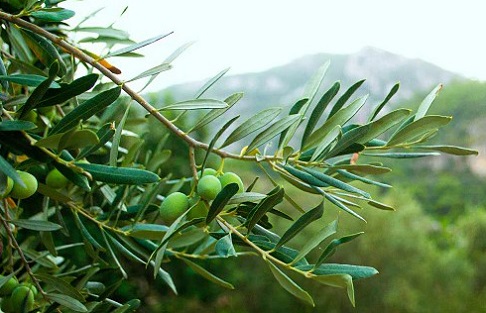Herbs And Phytochemicals: In Vitro And Silico Studies Shows Potential Of Olive Leaves Extract As An Antiviral Against SARS-CoV-2
Nikhil Prasad Fact checked by:Thailand Medical News Team Apr 28, 2024 11 months, 3 weeks, 5 days, 3 hours, 41 minutes ago
Herbs And Phytochemicals: The ongoing COVID-19 pandemic has underscored the urgent need for effective treatments against SARS-CoV-2, the virus responsible for the disease. Despite the availability and efficacy of vaccines, there remains a global demand for treatments that can aid in the management and recovery of COVID-19 patients. In this context, herbal remedies have gained attention for their potential antiviral properties. Olive leaf extract, rich in phytochemicals, has emerged as a candidate for antiviral therapy against SARS-CoV-2. This
Herbs And Phytochemicals news report delves into the in vitro and in silico studies evaluating the antiviral potential of olive leaves extract, highlighting its efficacy and potential applications in combating COVID-19.
 In Vitro And Silico Studies Shows Potential Of Olive Leaves Extract As
In Vitro And Silico Studies Shows Potential Of Olive Leaves Extract As
An Antiviral Against SARS-CoV-2
Background on SARS-CoV-2 and Current Treatment Landscape
The COVID-19 pandemic has led to significant morbidity and mortality worldwide, prompting an urgent search for effective treatments. While vaccines have been developed and deployed globally, the efficacy and safety of other treatment options remain under scrutiny. Currently, only a limited number of drugs, such as Paxlovid®, have received FDA approval for managing COVID-19 infections. This underscores the importance of developing diverse antiviral medications to effectively control the spread and impact of the virus.
Herbal Remedies and Antiviral Potential
Traditional medicinal practices have long utilized natural products, including herbal remedies, for treating various illnesses, including viral infections. Olive leaf extract, containing compounds like oleuropein, hydroxytyrosol, verbascoside, luteolin, and apigenin-7-O-glucoside, has demonstrated antiviral properties against a range of viruses, including respiratory viruses and HIV-1. Several studies have highlighted the potential of olive leaf extract and its constituents in managing COVID-19 infections.
In Silico Insights: Molecular Docking Studies
Molecular docking studies play a crucial role in evaluating the interactions between bioactive compounds and target proteins. In this study, major phytoconstituents from olive leaves were subjected to in silico molecular docking against key SARS-CoV-2 targets, including methyl transferase, helicase, Plpro, Mpro, and RdRp. The results revealed significant interactions and strong binding affinities of olive leaf compounds with these viral targets.
Results of In Silico Molecular Docking
The docking scores obtained from the in-silico studies indicated potent antiviral activity of olive leaf compounds against key SARS-CoV-2 targets. Verbascoside, oleuropein, apigenin-7-O-glucoside, and luteolin-7-O-glucoside exhibited strong binding affinities with methyl transferase, helicase, Plpro, Mpro, and RdRp, suggesting their potential as effective antiviral agents. These findings provide valuable insights into the mechanism of action of olive leaf extract agains
t SARS-CoV-2.
In Vitro Antiviral Assay
Further assessment of the antiviral activity was conducted through in vitro assays using standardized olive leaf extract (SOLE) containing 20% oleuropein. The results indicated a moderate antiviral activity of SOLE against SARS-CoV-2, with an IC50 of 118.3 μg/mL. While the in vitro efficacy was not as potent as the in-silico predictions, it still highlights the potential of olive leaf extract as a natural supplement for managing COVID-19 infections.
Discussion and Interpretation of Findings
The combined in silico and in vitro results shed light on the antiviral efficacy of olive leaf extract against SARS-CoV-2. While in silico studies demonstrated strong interactions and binding affinities, the in vitro assay revealed a more modest antiviral effect. This could be attributed to various factors, including the presence of other compounds in the extract that may impact overall activity. Nonetheless, the findings support the potential use of olive leaf extract as part of a holistic approach to COVID-19 management.
Conclusion and Future Directions
In conclusion, the study underscores the promising antiviral properties of olive leaf extract and its constituents against SARS-CoV-2. Verbascoside, oleuropein, and other compounds show significant inhibitory effects on key viral targets, paving the way for further research and development of natural antiviral therapies. However, additional in vivo and clinical studies are warranted to validate these findings and explore the full therapeutic potential of olive leaf extract in combating COVID-19 and related viral infections.
Future Research Directions
Future research endeavors should focus on:
-Conducting comprehensive in vivo studies to validate the antiviral efficacy observed in vitro and in silico.
-Exploring potential synergistic effects of different compounds within olive leaf extract.
-Investigating the safety profile and potential side effects of prolonged use of olive leaf extract as a therapeutic agent.
-Clinical trials to assess the efficacy of olive leaf extract in COVID-19 patients and its role in combination therapies.
Overall, the findings presented in this study contribute to the growing body of evidence supporting the use of herbal remedies like olive leaf extract in the fight against SARS-CoV-2 and emerging viral threats.
The findings from the study conducted by researchers from King Khalid University-Saudi Arabia, King Salman International University (KSIU)-Egypt, National Research Centre-Egypt, Cairo University-Egypt, Fayoum University-Egypt and Kafrelsheikh University-Egypt were published in the peer reviewed journal: PLOS ONE.
https://journals.plos.org/plosone/article?id=10.1371/journal.pone.0301086
For the latest on
Herbs And Phytochemicals, keep on logging to Thailand Medical News.
